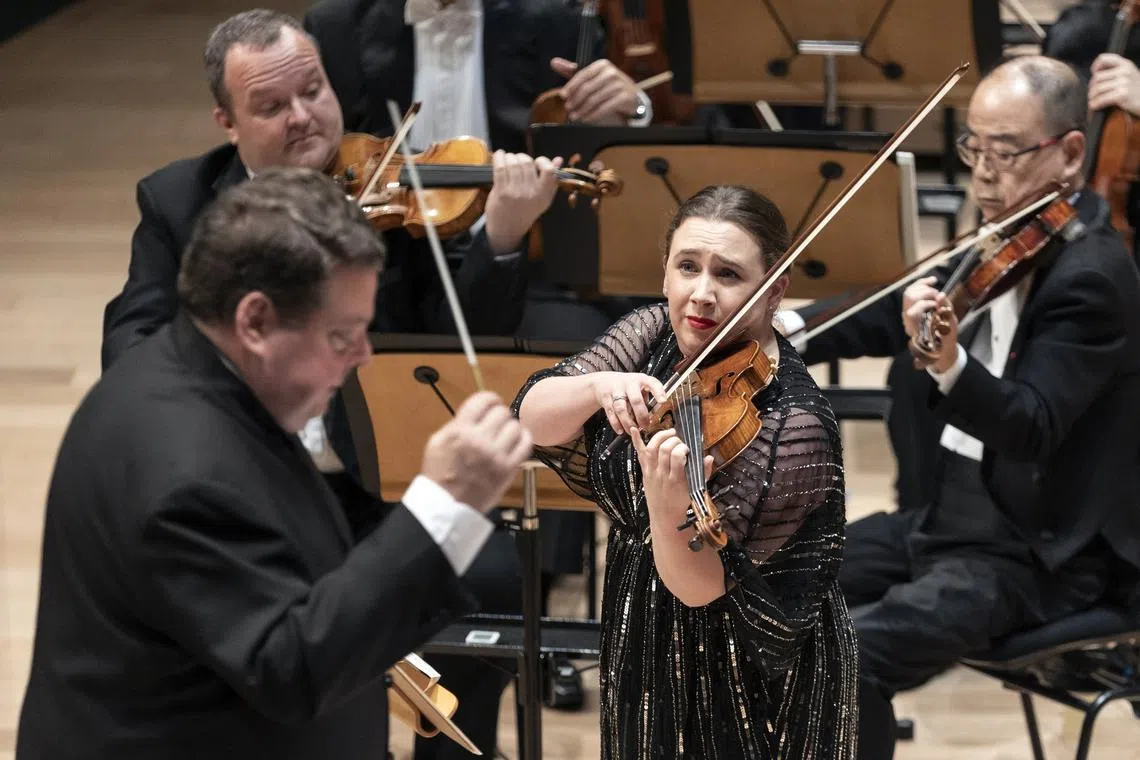Concert review: SSO revives forgotten works by American composers for recording project
Sign up now: Get ST's newsletters delivered to your inbox

Violinist Chloe Hanslip and SSO's former principal guest conductor Andrew Litton led the orchestra in two concerts for its latest recording project.
PHOTO: CHRIS P. LIM
Follow topic:
Bennett Violin Concerto and Tchaikovsky 4
Singapore Symphony Orchestra
Esplanade Concert Hall
Oct 20, 7.30pm
Duke Violin Concerto and Tchaikovsky 6
Singapore Symphony Orchestra
Esplanade Concert Hall
Last Friday, 7.30pm
The latest recording project of the Singapore Symphony Orchestra (SSO) showcased the revival and Asian premieres of long-forgotten violin concertos by two 20th-century American composers better known for their work in popular and stage music.
These were featured in two concerts with British violinist Chloe Hanslip and SSO’s former principal guest conductor Andrew Litton, coupled with two Tchaikovsky symphonies.
Robert Russell Bennett (1894 to 1981) is remembered for his orchestrations of Broadway musicals, including The Sound Of Music and South Pacific.
His four-movement Violin Concerto from 1941 straddled both serious and light music.
Opening like an outtake from Leroy Anderson’s Sleigh Ride, the solo violin’s confident entry was, however, a show of serious intent.
Hanslip’s prowess was amply displayed in a serious old-school cadenza, and exciting perpetual motion later exhibited in the third and fourth movements.
The latter possessed the same frenetic energy and pace as the finale of Samuel Barber’s famous violin concerto. The beautiful slow movement, with lush orchestral strings, hinted strongly that this was glorified film music.
The following Friday’s concert featured the 1943 Violin Concerto by Vladimir Dukelsky (1903 to 1969), better known by his Americanised alias Vernon Duke.
Composer of popular jazz standards like April In Paris and Taking A Chance On Love, his three-movement concerto was a longer work made of sterner stuff.
To borrow a metaphor, Duke was chalk to Bennett’s cheese.
It was hard to discern the key the concerto was in, its dissonant and chromatic idiom defying attempts, but the virtuosity was never in doubt.
Hanslip had to dig deep into a long and thorny cadenza midway through the first movement.
The second movement was a waltz, but not anything like Strauss. Its mock sentimentality and elusive melody put paid to all pretence, before it closed with three abrupt and bumpy chords.
The imaginative theme and variations finale echoed modern German composer Paul Hindemith’s astringency, leading one to conclude that composers might have been taken seriously if they sounded like neo-Bachian Hindemith or atonal Schoenberg, preferably both.
Whose concerto would better stand the test of time? Judging by these performances, the deeper and more substantial Duke would edge the lighter and more entertaining Bennett.
About Tchaikovsky, one would scarcely have encountered a more passionate reading of his Fourth Symphony In F Minor. Its opening “Fate” motif was brilliantly nailed by the brass in imperious form, summing up its gripping narrative on a whole.
Rachel Walker’s solo oboe stood out in the slow movement while massed pizzicato strings swamped the Scherzo with a wall of sonority.
The hell-for-leather ride in the blistering finale made it all the more memorable.
More melodrama came in the Sixth Symphony In B Minor, or the Pathetique, one week later.
Unrelieved gloom enveloped its opening, conductor Litton’s vision ensured its grim message was understood by all. The furious fugato of a development was gripping, contrasted by the faux gentility of the second movement’s bittersweet waltz.
The Scherzo’s relentless march was crafted as the ultimate study in crescendo (that is until Shostakovich’s Leningrad Symphony almost 50 years later) and a quickening of pace made it even more thrilling.
As if to forestall inappropriate premature applause, the finale’s Adagio Lamentoso followed without a break, and the composer’s desperate descent into despondency was complete.
There could be no more gut-wrenching finality, performed by the orchestra with knowing sympathy and requisite pathos, to a symphony such as this.

